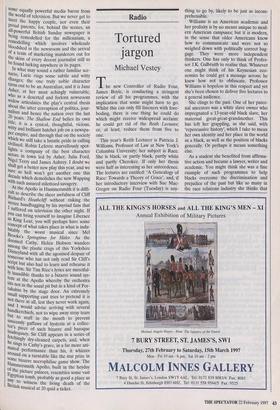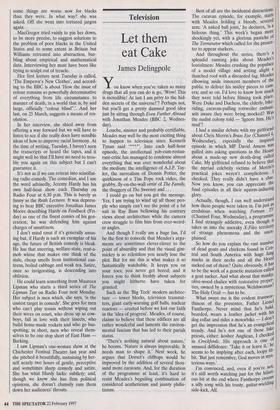Radio
Tortured jargon
Michael Vestey
The new Controller of Radio Four, James Boyle, is conducting a stringent review of all his programmes, with the implication that some might have to go. Whilst this can only fill listeners with fore- boding, there is one thing he could do which might receive widespread acclaim: he could get rid of the Reith Lectures; or, at least, reduce them from five to one.
This year's Reith Lecturer is Patricia J. Williams, Professor of Law at New York's Columbia University; her subject is Race. She is black, or partly black, partly white and partly Cherokee. If only her thesis were half as interesting as her antecedence. The lectures are entitled: 'A Genealogy of Race: Towards a Theory of Grace', and, if her introductory interview with Sue Mac- Gregor on Radio Four (Tuesday) is any- thing to go by, likely to be just as incom- prehensible.
Williams is an American academic and her prolixity is by no means unique to mod- ern American campuses; but it is modern, in the sense that older Americans know how to communicate and were not so weighed down with politically correct bag- gage. They were more independent thinkers. One has only to think of Profes- sor J.K. Galbraith to realise that. Whatever one might think of his Keynesian eco- nomics he could get a message across; he knew how not to obfuscate. Professor Williams is hopeless in this respect and yet she's been chosen to deliver five lectures to a general audience.
She clings to the past. One of her pater- nal ancestors was a white slave owner who impregnated a 13-year-old black slave, her maternal great-great-grandmother. This has left her grappling, as she said, with `repercussive history', which I take to mean her own identity and her place in the world as a black, as well as the position of blacks generally. Or perhaps it means something else.
As a student she benefited from affirma- tive action and became a lawyer, writer and academic. You might think she was a fine example of such programmes to help blacks overcome the discrimination and prejudice of the past but like so many in the race relations industry she thinks that some things are worse now for blacks than they were. In what way? she was asked. Off she went into tortured jargon again.
MacGregor tried vainly to pin her down, to be more precise, to suggest solutions to the problem of poor blacks in the United States and to some extent in Britain but Williams retreated into abstraction, bur- bling about empirical and mathematical data. Interviewing her must have been like trying to sculpt out of treacle.
Her first lecture next Tuesday is called, `The Emperor's New Clothes', and accord- ing to the BBC is about 'How the issue of colour remains so powerfully determinative of everything from life circumstance to manner of death, in a world that is, by and large, officially "colour blind—. And her last, on 25 March, suggests a means of res- olution.
In her interview, she shied away from offering a way forward but we will have to listen to see if she really does have sensible ideas of how to improve racial harmony. At the time of writing, Tuesday, I haven't seen the transcripts or heard the tapes, and it might well be that I'll have no need to trou- ble you again on this subject but I can't guarantee it.
It's not as if we can retreat into scintillat- ing radio comedy. The comedian, and I use the word advisedly, Jeremy Hardy has his own half-hour show each Thursday on Radio Four at 6.30 p.m. This is barely as funny as the Reith Lectures. It was depress- ing to hear BBC executive Jonathan James Moore describing Hardy on Feedback (Fri- day) as one of the finest comics of his gen- eration; he was defending him against charges of smuttiness.
I don't mind smut if it's generally amus- ing but, if Hardy is such an exemplar of his age, the future of British comedy is bleak. He has that sneering, welfare-state, rent-a- mob whine that makes one think of the stale, cheap smells from institutional can- teens, boiled cabbage and weak tea. Satire, once so invigorating, is descending into oblivion.
He could learn something from Maureen Lipman who starts a third series of The Lipman Test on Radio Four next Monday. Her subject is men which, she says, 'is the easiest target in comedy'. She goes for men who can't play tennis without wiping out their wives on court, who dress up as cow- boys, fall in love with their insects, who build home-made rockets and who go bus- spotting; in short, men who reveal them- selves to be one stop short of East Ham Barking.
I saw Lipman's one-woman show at the Chichester Festival Theatre last year and she pitched it beautifully, sustaining by her- self nearly two hours of gentle, perceptive and sometimes sharp comedy and satire. She has what Hardy lacks: subtlety; and, though we know she has firm political opinions, she doesn't clumsily ram them down her audiences' throats.



























































 Previous page
Previous page